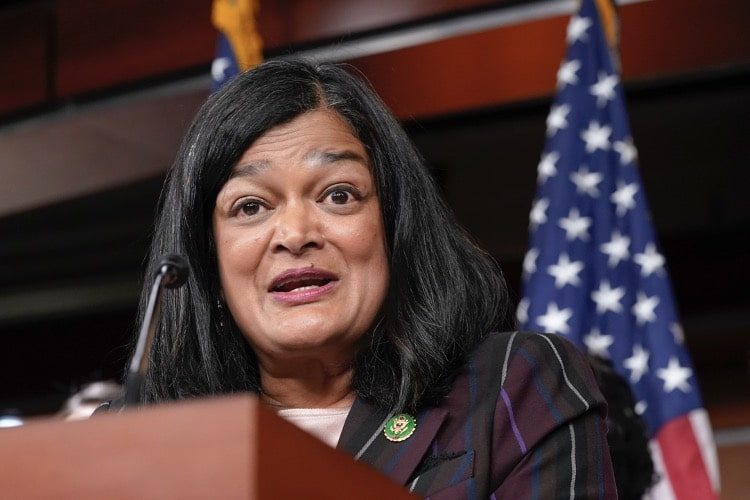
Representative Pramila Jayapal (D-Wash.) has gotten herself into some hot water over remarks she made at the Netroots Nation convention in Chicago over the weekend. After pro-Palestinian protestors disrupted the event, Jayapal attempted to ease the tension by referring to Israel as a “racist state.”
Since then, Jayapal, the chair of the Congressional Progressive Caucus, has faced bi-partisan, national, and international criticism for the remark.
Addressing the pro-Palestinian protestors, Jayapala said, “As somebody who’s been in the streets and participated in a lot of demonstrations, I want you to know that we have been fighting to make it clear that Israel is a racist state, that the Palestinian people deserve self-determination and autonomy, that the dream of a two-state solution is slipping away from us.”
In a statement, Jayapal walked back the “racist state” statement somewhat, but it could not called an apology because she appeared to double down on calling the Netanyahu government in Israel “extreme racists.”
“At a conference, I attempted to defuse a tense situation during a panel where fellow members of Congress were being protested. Words do matter and so it is important that I clarify my statement,” Jayapal explained. “I do not believe the idea of Israel as a nation is racist. I do, however, believe that Netanyahu’s extreme right-wing government has engaged in discriminatory and outright racist policies and that there are extreme racists driving that policy within the leadership of the current government. I believe it is incumbent on all of us who are striving to make our world a more just and equitable place to call out and condemn these policies and this current Netanyahu government’s role in furthering them.”
Not even Democrats would defend Jayapal’s words. House Democrat Leader Hakeem Jeffries and other top Democrats released a statement condemning Jayapal’s language without naming the lawmaker.
“Israel is not a racist state,” read the first line of the Democrat statement.
Jayapal claimed that the statement was not supposed to be about her and said she was surprised by the statement.
“In my conversations with [Jeffries], that statement was not going to start with that line,” Jayapal said. “They did not intend this to be a condemnation of me.”
Although the Democrat statement did not name Jayapal, it certainly appeared to be addressing what the Washington Democrat said.
The White House, however, refused to condemn Jayapal’s comment.
Jayapal’s remarks led to House Resolution 92, sponsored by Josh Gottheimer (D-N.J.), which affirms America’s support for Israel and rejects “hate, discrimination, and antisemitism in all forms, including antisemitism masquerading as anti-Israel sentiment; stands in unity with the Jewish people in the United States and around the world against the rising antisemitism; and explicitly condemns perpetuation of antisemitic tropes, including claims of dual loyalty, control, and other conspiracy theories antithetical to American values.”
The resolution received more than 400 votes in the House, including Jayapal’s.
Jayapal claimed victimhood over the controversy in an interview with the Seattle Times.
“It’s not right to call out progressives, but then not recognize that most of us that get called out are women, Black, brown, immigrant. You cannot, you just cannot skip over that,” Jayapal told the Times.
Jayapal released her own statement: “As an immigrant woman of color who has fought my whole life against racism, hate, and discrimination of all kinds and viscerally feels when anyone’s very existence is called into question, I am deeply aware of the many challenges we face in our own country to live up to the ideals of our nation here.”
All of this controversy comes as Israel’s President Isaac Herzog addressed a joint session of Congress today in which he hoped to reassure America that the state of Israel’s democracy remains strong. Members of Jayapal’s own Progressive Caucus announced they were skipping the speech over political differences with Israel. Jayapal skipped the event as well but blamed scheduling conflicts.


